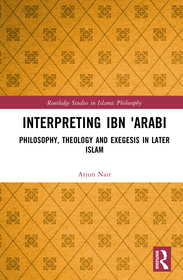
Interpreting Ibn ʿArabī
Philosophy, Theology, and Exegesis in Later Islam
Sorozatcím: Routledge Studies in Islamic Philosophy;
-
10% KEDVEZMÉNY?
- A kedvezmény csak az 'Értesítés a kedvenc témákról' hírlevelünk címzettjeinek rendeléseire érvényes.
- Kiadói listaár GBP 145.00
-
69 273 Ft (65 975 Ft + 5% áfa)
Az ár azért becsült, mert a rendelés pillanatában nem lehet pontosan tudni, hogy a beérkezéskor milyen lesz a forint árfolyama az adott termék eredeti devizájához képest. Ha a forint romlana, kissé többet, ha javulna, kissé kevesebbet kell majd fizetnie.
- Kedvezmény(ek) 10% (cc. 6 927 Ft off)
- Kedvezményes ár 62 346 Ft (59 378 Ft + 5% áfa)
Iratkozzon fel most és részesüljön kedvezőbb árainkból!
Feliratkozom
69 273 Ft

Beszerezhetőség
Még nem jelent meg, de rendelhető. A megjelenéstől számított néhány héten belül megérkezik.
Why don't you give exact delivery time?
A beszerzés időigényét az eddigi tapasztalatokra alapozva adjuk meg. Azért becsült, mert a terméket külföldről hozzuk be, így a kiadó kiszolgálásának pillanatnyi gyorsaságától is függ. A megadottnál gyorsabb és lassabb szállítás is elképzelhető, de mindent megteszünk, hogy Ön a lehető leghamarabb jusson hozzá a termékhez.
A termék adatai:
- Kiadás sorszáma 1
- Kiadó Routledge
- Megjelenés dátuma 2025. december 29.
- ISBN 9781041091271
- Kötéstípus Keménykötés
- Terjedelem260 oldal
- Méret 234x156 mm
- Nyelv angol 700
Kategóriák
Rövid leírás:
Interpreting Ibn ʿArabī: Philosophy, Theology and Exegesis in Later Islam offers a comprehensive and critical examination of one of Islam’s most enigmatic and influential thinkers.
TöbbHosszú leírás:
Ibn ʿArabī (d. 638/1240) is perhaps the most challenging intellectual figure of later Islamic history, being at once highly celebrated and highly vilified. This book explores an interpretive and commentary tradition around his controversial ideas.
TöbbTartalomjegyzék:
Acknowledgments
Note on Transliteration and Translation
Introduction
The Problems (mushkilāt) of the Fuṣūṣ: Interpretive Divergences
From the Lack of Understanding (ʿadam al-fahm): Solving the Problems of the Fuṣūṣ
The Present Study: Interpreting Ibn ʿArabī
1 “All is He, All is Not He”: The Vision of Huwa-lā Huwa
The Entities (aʿyān) are Not Made (ghayr majʿūl) and Non-Existent (maʿdūm)
The Mirror-Entities and the Color-Entities
The Pre-Existent Forms (ṣuwar) of the Entities: The Cloud, the Barzakh, the Creator-Real
2 Divine Power and Human Freedom
The Essence (Dhāt) and the Divinity (Ilāh), Determination (taqdīr) and Creation (khalq)
Freedom and Compulsion, Responsibility (taklīf) and Predestination (qadar)
3 Incomparability and Similarity
To Affirm Incomparability is to Affirm Limitation (taḥdīd) and Restriction (taqyīd)
Transcending the God of Beliefs (al-ilāh al-muʿtaqadāt)
The Divinity Clothed in Forms of Belief: Worshiping the Idols of Belief
4 “Created in his/His Form”: The All-Comprehensive Form of Man
Originated and Beginningless (ḥādith azalī), Perpetual and Endless (dāʾim abadī)
The Problem of Man’s Firstness (awwaliyya)
Creation (khalaqa) in Two Senses: Determination (taqdīr) and Existentiation (ījād)
5 Becoming a Form of God (ṣūrat al-Ḥaqq)
The False Form (ṣūra bāṭila) of the Pharaoh of Moses (Firʿawn Mūsā)
The Form of al-Kharrāz, One of the Tongues of God (lisān min alsinat al-Ḥaqq)
6 The Messenger takes his Knowledge from the Seal of the Saints
The Prophets (anbiyāʾ) in the Fuṣūṣ al-ḥikam
The Seal of the Saints: “the space for two bricks” (mawḍiʿ labinatayn)
7 Interpreting the Qurʾān
Between taʾwīl, ishāra, and ʿubūr: Ibn ʿArabī’s Qurʾānic Hermeneutics
Abraham’s Sacrifice (dhabḥ), God’s Deception (makr), Drowning in Knowledge
8 The Hermeneutics of Mercy
The Faith of Pharaoh (īmān Firʿawn) in Q. 10:90-92
From Torments (ʿadhāb) to the Sweetness of Torments (ʿudhūba)
Conclusion: Interpreting the Shaykh al-Akbar
“He/not He” Revisited: Ambiguity and Knowledge as Perplexity (ḥayra)
“He who does not know the status of imagination has no knowledge”
Bibliography
Index
Több




